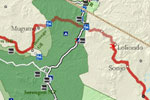
Lionness with kill in Tanzania. Photo by: Rhett A. Butler.
The Serengeti ecosystem got a major reprieve last week when the East African Court of Justice (EACJ) ruled against a hugely-controversial plan to build a paved road through Tanzania’s Serengeti National Park. The court dubbed the proposed road “unlawful” due to expected environmental impacts. The case was brought to the regional court by the Africa Network for Animal Welfare (ANAW) in 2010, but has taken four years to receive a definitive ruling.
“[We] fully [respect] Tanzania’s sovereignty and its need for national development,” Josphat Ngonyo, ANAW’s Executive Director said in a statement. “However, by taking up this matter, ANAW was in actual fact protecting a resource that would be of future benefit not only to Tanzanians or East Africans but also the entire humanity.”
The road, which would have bisected the northern—and most remote—portion of Serengeti National Park has had many ups and down. After opposition by the UN, German and U.S. governments, and the Tanzanian tourist lobby, it was widely reported that the Tanzanian government had cancelled the commercial road in 2010. A few days later, though, it became clear that the government hadn’t cancelled the road at all, but only tweaked their plans, changing the road from paved to unpaved while it ran through the park for 53 kilometers.
Yet critics contended if the road was built at all, it would eventually become paved, bringing an influx of traffic across the ecosystem and potentially severing Serengeti’s great migration. In fact a leaked government report estimated that over million vehicles would be using the road annually by 2036.
The new ruling, however, removes the threat of a paved road for the time being.
Despite being seen as a rebuke to the Tanzanian government—and a death-knell for one of President Jakaya Kikwete’s promises—the government was dismissive of the ruling.
“The government had long decided not to build the road across the Serengeti,” said Natural Resources and Tourism Minister Lazaro Nyalandu in response to the court’s decision, as reported by the East African.
Earlier this month, the Tanzanian government announced its intention to go ahead with a German-funded study for a different route for the commercial highway. This one would swing south, circumventing the park altogether. The route has been one option raised by conservationists and foreign governments alike.
However, the cancellation of the road could impact negatively remote northern communities that are looking for easier access to more populated areas. A few years ago the German government offered to build better access roads for these communities, which wouldn’t cut through the full park.
Two million wildebeest, zebra, and antelope migrate annually across the Serengeti Plains. Research in 2011 found that a highway through the park could have cut the wildebeest population by 35 percent not including additional impacts such as wildlife-collisions, rise in poaching, and other developments. The leaked government report also predicted a lesser-migration, which would further imperil the region’s already endangered big predators due to prey decline.
Related articles
Compromise on Serengeti road?: build an elevated highway
(05/22/2013) Famed anthropologist and conservationist Richard Leakey has proposed a possible solution to the hugely controversial Serengeti road: build an elevated highway. Leakey made the remarks during a conference at Rutgers University on May 14th, as reported by Live Science. The Tanzanian government’s plans to build a road through the remote, northern Serengeti has come under both environmental and international criticism, as scientific studies and leaked government reports have found the proposed road would hugely hamper the world famous migration across the plans.
Poaching in Serengeti seems worth the risk
(12/10/2012) Illegal hunting in Tanzania’s Greater Serengeti Ecosystem (GSE) remains a prevalent activity for local people, despite government regulation and grassroots movements to prevent it. A new paper from mongabay.com’s open-access Tropical Conversation Science examines the factors that drive poachers to continue their activities, despite the high costs involved. By interviewing citizens involved with illegal hunting in the Western part of the Serengeti, they were able to identify key risks that are faced by the hunters as well as the perceived gains of a successful hunt.
Poaching in the Serengeti linked to poverty, high legal hunting prices
(07/09/2012) In the effort to protect the Serengeti—arguably Africa’s most famous ecosystem—one of the major problems is the bushmeat trade. Population growth, little available protein, poverty, and a long-standing history of hunting has led many communities to poach wildlife within Serengeti National Park. Interviewing over a thousand community members in the western Serengeti, scientists found that community members are largely aware that wildlife hunting is illegal and that conservation of wild species is important, but hunt animals anyway partly out of necessity.
Legal case against Serengeti road moves forward
(03/21/2012) A regional case against the construction of a proposed road through Serengeti National Park has moved to trial after a judge with the East African Court of Justice (EACJ) threw out concerns by Tanzania reports the Daily Nation. The government of Tanzania has proposed a controversial highway that would bifurcate the northern part of the Serengeti National, only to see their plans stalled by a lawsuit filed by the Kenyan-based NGO, Africa Network for Animal Welfare (ANAW), which argues that the road could have massive consequences for the entire Serengeti ecosystem, a view shared by many scientists.
Richard Leakey: ‘selfish’ critics choose wrong fight in Serengeti road

(07/02/2011) The controversial Serengeti road is going ahead, but with conditions. According to the Tanzanian Minister for Natural Resources and Tourism, Ezekiel Maige, the road will not be paved and it will be run by the Tanzanian park authority who will have the power to monitor traffic to ‘ensure no harm comes to the wildlife population’. Critics argue that even an unpaved road would eventually cripple the largest land migration in the world. However, famed Kenyan conservationist, ex-politician, and anthropologist, Richard Leakey, told mongabay.com that critics of the road are focusing on the wrong fight while failing to respect Tanzania’s right to develop. Leakey says that instead of attempting to stop the road from being built, which he believes is inevitable, critics should instead focus on funding a truly wildlife-friendly road.
Unpaved road through Serengeti to progress

(07/02/2011) After a week of confusion, the Tanzanian government has finally clarified its position on the hugely-controversial Serengeti road. The Minister for Natural Resources and Tourism, Ezekiel Maige, confirmed that a paved highway will not be built through the northern Serengeti National Park, however the government is still planning to construct a gravel road through the park. Yet critics have long warned that even an unpaved road would open Pandora’s box: eventually commercial and population pressure would push the road to be paved, widened, and fenced leading to a collapse of the world’s largest remaining-and most famous-land migration. Two million wildebeest, zebra, and Thomson’s gazelle pass along this route in annual migration from Tanzania to Kenya.
How do tourists view the Serengeti?
(06/27/2011) Serengeti National Park in Tanzania, an immense expanse of East African savanna, is a world famous tourist destination because of its plentiful megafauna, particularly the great migrating herds of wildebeest. Yet despite huge visitor numbers and the annual revenue of millions of US dollars, local poverty and increasing population continue to imperil the reserve. A new study in mongabay.com’s open-access journal Tropical Conservation Science found that while tourists to the Serengeti overall report a high degree of satisfaction with their trip, they are concerned about the future of the ecosystem.